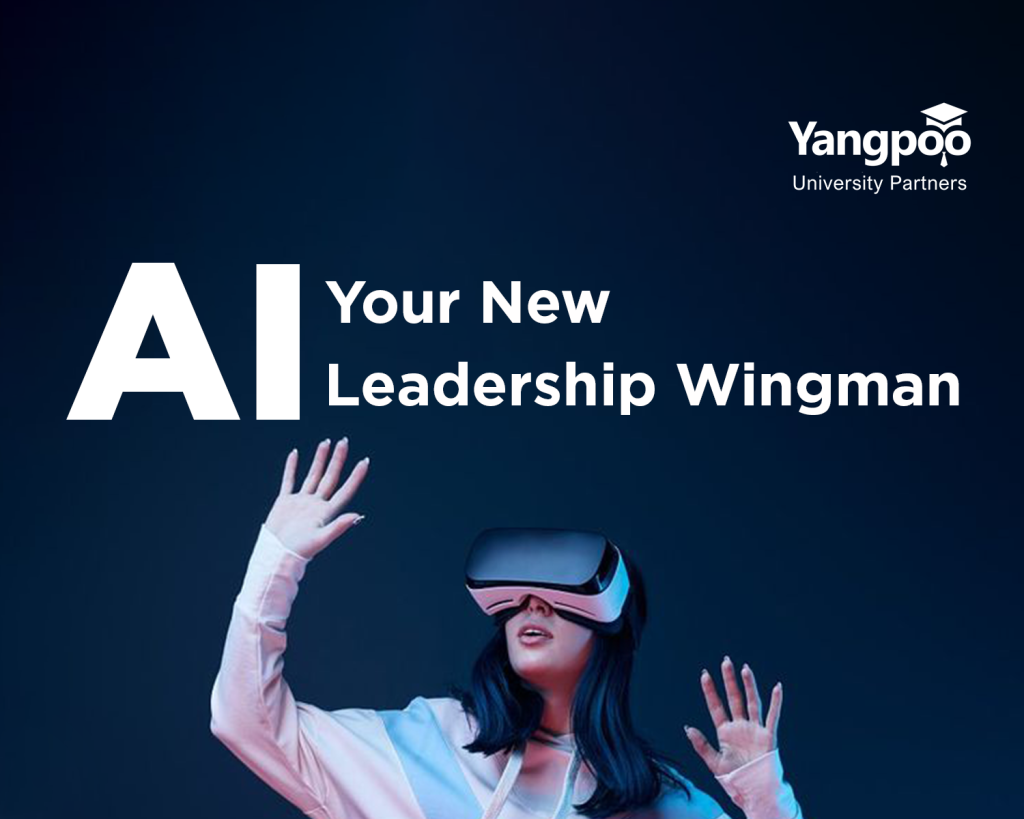AI and Leadership: Your New Leadership Wingman
Imagine a chess grandmaster, deep in concentration, meticulously planning moves and devising strategies. Now, picture that same player equipped with an AI assistant capable of analyzing millions of potential moves and predicting outcomes in mere seconds. This scenario mirrors the new reality of AI in leadership within our technologically advanced world.
AI leadership is revolutionizing how leaders across various industries approach decision-making, foster innovation, and steer their organizations. In the coming years, the most successful modern leaders won’t be those who shy away from AI, but those who effectively harness its power to augment their capabilities.
By leveraging AI, leaders can sharpen their learning skills, enabling them to stay ahead in competitive industries, much like professionals pursuing other top degrees to enhance their qualifications.
Understanding AI and Leadership
According to a well-known professional social media platform, 74% of executives believe that Generative AI and leadership will be advantageous for both employees and organizations. As AI technologies advance, leaders are increasingly recognizing their potential to enhance operations, customer service, and marketing strategies.The relationship between AI and leadership is becoming a driving force for innovation, enabling organizations to become more agile and competitive in the market.
Additionally, 47% of executives see AI as a significant factor in career development. In the rapidly evolving business environment, investing in AI and Generative AI education is essential for maintaining a competitive edge and leading effectively.
The Evolution of Leadership: From Intuition to Data-Driven Decisions
Throughout the history leadership, it has often been portrayed as an art form—a skill honed through experience and guided by intuition. For centuries, great leaders were celebrated for their gut instincts, their ability to assess situations, and make bold decisions in the face of uncertainty. However, this era is coming to an end with the rise of a new titan: artificial intelligence (AI). This technological force has replaced much of the intuition-driven decision-making, seeming to possess an almost mystical ability to navigate complex choices using data. AI and leadership development are becoming essential components for modern executives looking to enhance their decision-making skills and adapt to rapidly changing environments.a.
AI and Leadership Development: Building Future Leaders (H2)
Artificial Intelligence (AI) is not just revolutionizing industries, it is transforming leadership itself by offering tools and technologies that enhance decision-making, strategic planning, and overall leadership effectiveness. In leadership, AI-driven tools provide leaders with data insights that enable faster, more informed decision-making. For instance, AI-powered dashboards can analyze vast amounts of information, providing leaders with real-time data to guide their strategies, assess risks, and predict outcomes more accurately.
AI in leadership also improves talent management, helping leaders identify high-potential employees through AI-driven performance analytics, streamline recruitment with AI-powered screening tools, and foster personalized employee development plans. AI can predict attrition rates, enabling proactive retention strategies, making human resources management more effective and employee-centric.
On a broader scale, AI in leadership tools, such as intelligent forecasting and predictive analytics, help leaders steer their organizations with greater precision, adapting quickly to market changes. AI’s hyper-personalization and sentiment analysis capabilities allow leaders to better understand customer needs and fine-tune marketing and sales strategies, increasing engagement and driving growth.As AI and leadership development continue to intertwine, leaders who embrace these technologies will be better equipped to navigate the complexities of the modern business landscape and drive their organizations towards success
How AI Enhances Leadership Capabilities(H2)
In the new era,AI in leadership data has become a critical business tool in this new paradigm. The traditional People-Process-Technology framework for success has evolved into a People-Process-Technology-Data framework, where data forms the core of everything.Leaders embracing AI and leadership integration find themselves better equipped to interpret and utilize data effectively, a capability that’s increasingly vital across industries.
The synergy between AI leadership tools and data-driven decision-making enables organizations to align internal processes with business goals more precisely. This alignment facilitates hyper-personalized customer experiences and targeted sales approaches. In this new landscape, leaders and their teams leverage diverse information sources, combining AI-powered analytics with human insight to navigate complex business challenges.
Data and metadata enable organizations to synchronize internal processes with business goals, allowing for hyper-personalized sales messages and customer experiences. In this new landscape, data-driven leaders and their teams rely on various information types and sources. They make high-impact decisions only after conducting strategic analysis of this wealth of data, combining the power of AI with human insight to navigate the complexities of the modern business world.
Conclusion
Throughout this exploration of artificial intelligence’s role in the future of work and leadership, it’s clear that AI is not merely a technological upgrade but a fundamental shift in how businesses operate and leaders function. AI empowers leaders with tools for better decision-making, efficiency in operations, and more strategic use of human talent by automating routine tasks and providing deep insights. Whether you’re in a Hybrid PGDM program from Welingkar or aiming for masters in business analytics, understanding AI’s role will be crucial for future success.
FAQs
How is AI used in leadership?
A.I has numerous transformative applications in leadership roles, including data-driven decision-making, optimizing talent management strategies, and significantly enhancing customer experiences. These areas represent just the beginning of what’s possible, with the potential for even greater advancements on the horizon. Various sophisticated models are already being implemented by governments, agencies, and organizations worldwide to drive innovation and efficiency.
What impact will artificial intelligence have on the future leadership role??
AI will become an indispensable part of our daily lives, much like smartphones. It’s no longer a luxury but a necessity. Leaders, from businesses to governments, must recognize the significant role AI plays in modern decision-making and operations.
What is leadership in the time of AI??
A. Effective leaders must not only understand AI’s potential to drive performance but also excel in strategic execution to maintain a competitive edge. Through a technologically informed approach, leadership can shift strategies into action, reshaping the dynamics of the situation . Cultivating these competencies ensures that organizations not only adapt to the digital age but lead the charge in innovation and success.
What are the ethical considerations of using AI in leadership?
A.Using AI in leadership raises important ethical questions. These include issues like fairness and bias, transparency and accountability, privacy and data security, job loss, how humans work with AI, and having clear rules for using AI. We must ensure fairness and bias in AI algorithms, transparency and accountability in decision-making, robust data protection measures, preparation for job loss due to automation, effective human-AI collaboration, and clear ethical frameworks for AI use. By proactively addressing these issues, we can harness the benefits of AI while ensuring responsible and ethical use of this powerful technology.
How can AI help leaders make better decisions?
A.AI can significantly enhance decision-making for leaders by analyzing vast data, identifying patterns, forecasting future outcomes, automating routine tasks, providing recommendations, optimizing processes, identifying and mitigating risks, personalizing recommendations, and ensuring ethical considerations. By leveraging the power of AI, leaders can make more informed, data-driven decisions, improve operational efficiency, mitigate risks, and enhance customer experiences.





